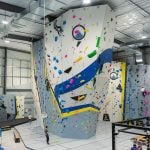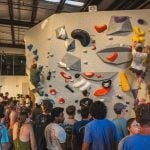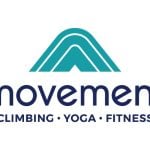
Previously, CBJ reported on some wisdom that On the Rocks’ General Manager D.J. Snell gained amid the first wave of the COVID-19 pandemic in Ohio. Like many gyms around the country, On the Rocks reopened with various mitigation protocols following temporary pandemic-related closure.
But a number of other gyms find themselves in an entirely different situation. For example, Scrapyard Climbing Collective, a 5,000-square foot facility featuring bouldering and roped climbing in Holland, Michigan, has been closed since March 16—with Michigan’s state policies making any reopening this month unlikely as well. “August will put us at nearly five months closed,” reiterates Scrapyard’s owner and founder, Josh Bochniak.
Such an extended closure has been an incredible challenge for Scrapyard, but Bochniak has still managed to learn a lot throughout the whole experience; there have been new lessons acquired and old lessons reinforced by the ongoing COVID crisis, and Bochniak took some time between all the planning and preparation to share some of that wisdom.
LESSON 1: People are gracious and generous
Long before the pandemic, Scrapyard made a point of highlighting its communal uniqueness. “The word ‘collective’ doesn’t represent a legal distinction or organizational structure for us,” reads the Scrapyard homepage. “We are not a co-op or non-profit climbing gym. Scrapyard Climbing Collective is a climbing facility that chooses to see our greatest opportunities not in the amount of revenue we can generate but by the number of people we can engage.”
And when speaking about the COVID crisis, specifically, owner Bochniak is frank in citing the people of Scrapyard as a vital component, even amid the gym’s ongoing closure. “My business remains viable because of the gracious generosity of more than a few members of our collective,” Bochniak says, pointing out that a number of people have continued paying their membership dues and even reached out to offer help in additional ways.
That connection with others is “life-giving,” according to Bochniak, and keen awareness of it could practically be another lesson in and of itself. “Every email, phone call, Zoom meeting, text message or other communication with members and staff has been a light in my days,” he says. “Things as simple as an email from a member saying, ‘I miss you,’ or checking in about what they’re up to has been life giving. This has been a good reminder of how much our work connects people and creates community and relationships.”

LESSON 2: Transparency and genuineness are vital
For many gyms, and under “normal” circumstances, it might be natural for the inner workings of a gym’s staff to carry a degree of mystique in the eyes of the customers; indeed, there is often a legitimate separation between what the members see compared to what the staff knows or does behind the scenes. But Bochniak has made an attempt to eliminate such disconnection at Scrapyard: “I have chosen, during this closure, to be as open and honest about everything as I possibly can be,” he says. “I have tried to keep in regular contact with members as I learn new information or have needed to ask for help. People appreciate being able to look ‘behind the curtain’ and feel informed about what is happening and as much about what the future holds as possible.”
Another way of looking at such honesty and transparency is that a gym is thus not sending mixed signals to its members. “It’s better to communicate, ‘I don’t know’ than it is to try to create a false sense of positivity,” explains Bochniak.
[adning id=”19811″]
LESSON 3: Patience is necessary
Almost like an offshoot of transparency, Bochniak admits that he has had to get very comfortable with phrases such as ‘We’ll see’ and ‘I am hopeful.’ To a large degree, he shares all the same emotions with the Scrapyard member base. For instance, like the members, he has not been able to plan for a specific reopening date, and has had to roll with the ever-changing information about the pandemic from the powers-that-be in Michigan and elsewhere.
Having to plan and then repeatedly being let down is something that Bochniak bluntly calls “exhausting and frustrating.” But the real key is to garner some knowledge from the arduous process and spin it into something positive: “Freedom has come in the ability to walk away after those plans have been made and just wait for the next step,” he notes.

LESSON 4: There’s only so much you can do
“It’s ok to not be busy,” Bochniak explains. For example, in the early days of Scrapyard’s temporary closure, Bochniak and the staff compiled a list of projects and tasks to be accomplished during the closure. However, as the reality of a long closure set in and staff were temporarily furloughed—laid off, basically—that list of projects got put on the shelf.
Bochniak says he has continued to chip away at smaller projects related to the gym, but, “the urge to be ever-productive during this closure has also been tempered by the fact that at some point there’s only so much that can be done right now.” For Bochniak, this means giving himself permission to step away and fill the other roles in life that need filling—largely being home with his family and helping run a household that is occupied continuously as a result of the pandemic.
Still, there is a flip side, which is that it is often hard not to be busy. So, there must be a balance. “Feeling a lack of productivity has made me examine how I assign value to my life and work,” Bochniak points out. “If my worth is tied up in being busy, then I am going to constantly drive toward busyness. This closure has made me examine life a little more, how I assign value to activity or time.”
LESSON 5: Be willing to ask for—and receive—help
For Bochniak and many other gym owners who have corresponded with CBJ over the past five months, the COVID crisis seems to have brought out some of the best aspects of the global climbing community—and this has been detectable at the local level too. “People want to provide help when they can, and even more so in these times,” Bochniak says. “Being willing to ask for help and receive it increases ownership and buy in from all of those around us.” As an illustration, Bochniak has received help for aspects ranging from cleaning and organizing, construction and maintenance, photography and marketing, to website work and video creation.
Similarly, a little bit of help from everyone makes a big difference, and this is a valuable realization that Bochniak admits he is continuing to learn: “There are few tasks that should be considered too small because the sum of those small tasks or contributions, when scaled up, becomes significant. It may not be a large stress for some of our members to contribute what they are monetarily, but it most certainly makes an enormous difference in our ability to continue as a business.”
LESSON 6: We are better together
In speaking to CBJ, Bochniak is quick to give a shoutout to a number of other gyms in Michigan—Climb Kalamazoo, Terra Firma, Planet Rock, Higher Ground and Inside Moves. The owners of those gyms, along with Bochniak, have been meeting on Zoom every couple of weeks to compare notes, collaborate on communication and procedures, and focus on the climbing community. It has been an unprecedented example of alliance and positive open discussion among many of Michigan’s leading climbing gyms. Simply, the temporary closures of all the gyms brought the owners closer together.
“I had never met several of these folks and now I look forward to our conversations,” Bochniak explains. “We are making the Michigan climbing community stronger and our individual gyms better through conversation, and it has made me feel far less alone during the past four months.”
Share Your Story
Are you a gym owner, manager or staffer who would like to share what you’ve learned from the ongoing pandemic challenges? If so, send us a message here. And stay tuned to CBJ for additional “Lessons Learned from the COVID Crisis” featurettes in the future.













